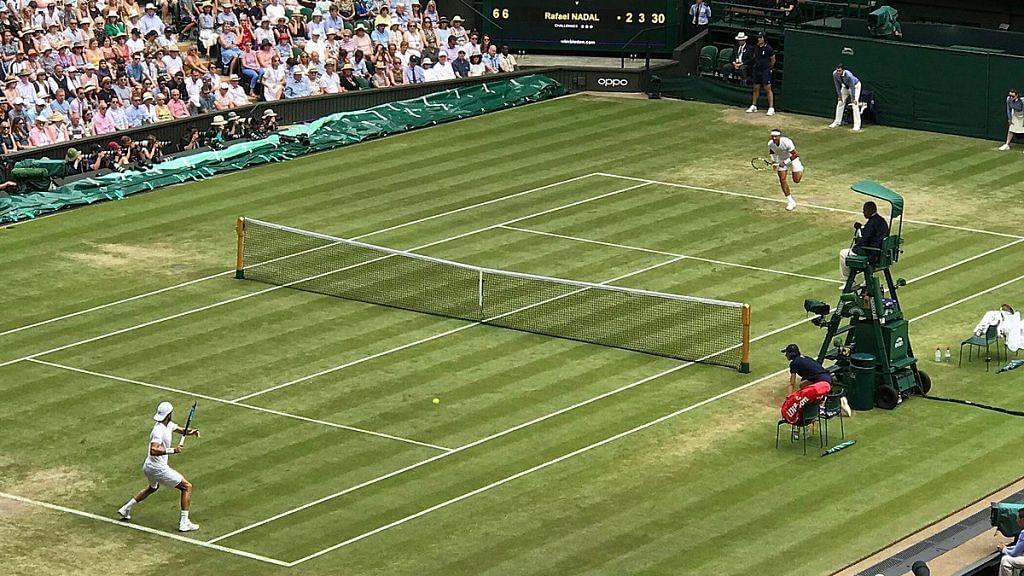After the IPL and Tokyo Olympics cancellations, questions are being raised about sporting events during the lockdown. Sports without crowds? Sports in a corona-free bubble? These are some of the outlandish proposals being considered to salvage our sports addiction in the corona world.
Necessity is the mother of invention – and our sports fix is necessary. Like all other cricket fans, I too have been mourning the loss of the IPL season; now, a summer without the Olympics, Test cricket, and Wimbledon is almost too much to bear. Major league sports must be reinvented.
Our world will not return to normal till we are all vaccinated. This is maybe two years away, and even then we will probably have to carry proof that we are corona-free. Big stadiums packed with fans cheering their sports heroes seems like a distant, forlorn dream.
Also read: BCCI suspends IPL 2020 till further notice
Bring sports back in corona-free bubbles
However, we can have the thrill and entertainment of major league sports in corona-free bubbles. Suitable regions with the necessary facilities can be selected. Teams can then be housed in sealed hotels for the season. Officials, camera crews, and other associated staff can have their own sealed hotels. There will be continuous testing and a cordon sanitaire will be created. Stadiums will be shorn of crowds. Watching sports on screens, big and small, will reign supreme.
All this would for sure require taking a fresh look at the sporting infrastructure, but sportspersons’ careers will be revived, fans will tune in, and advertising revenues will follow.
Corona-free bubbles are already being investigated for baseball and golf, a similar model can be applied to other sports such as the French and US Open (tennis), the Indian Premier League (cricket), and the Tour De France (cycling). How would such a bubble get created?
Also read: Covid-19 forces BCCI and cricketers to brace for loss of income, pay cuts
Creating the bubble
First, each sport is going to have to select the right location with plenty of stadiums or fields to enable a competitive league or tournament. Teams cannot travel around the country playing matches in different cities. They will have to be sequestered in a suitable region. If there have to be 2 to 4 matches every evening, then there will need to be at least 2-3 high-quality fields.
For instance, Mumbai can be an ideal location for the IPL because teams can play at the Wankhede Stadium, the Brabourne Stadium, Bombay Gymkhana ground, or the MCA ground in the Bandra-Kurla complex. Tennis already has excellent venues, such as the USTA Billie Jean King National Tennis Center in New York, with 22 tournament courts, of which 3 are covered stadiums or the All England Club with 18 tournament grass courts of which 2 are covered stadiums.
Players will be tested to ensure that they are corona-free and brought to these locations. Once they are tested and cleared, they will form a corona-free population that can be kept in a sealed hotel or other residences during the tournament or league.
If they leave, they will be allowed back if they test negative. All other required personnel – officials, camera crew, grounds-persons, linepersons, and executives – will also have to be tested and then kept in sealed locations. Tests can be done every two weeks or so to ensure that no infection is creeping in.
Entry and exit from the corona-free bubble will be through testing, which is now quick and efficient. The most efficient tests can now do a painless throat or nose swab examination and give you a result in less than 15 minutes. Therefore, setting up a corona-free bubble is now straightforward. Testing results can be downloaded onto a smartphone app, which will generate a QR code giving access to the necessary locations.
Also read: Wimbledon cancelled due to Covid-19 pandemic, first time since World War II
Big screens, drones, AR to enhance viewer experience
Crowds are not likely to be present for sporting events this year. Instead, large and small screens will bring us close to the action and we could have new camera angles and mikes, widespread use of drones that can bring spectator-level views from different parts of the stadium, and different types of augmented reality (AR) to bring you into the action.
In the future, it is possible that, with the use of widespread testing and tracing apps, people who have either had the coronavirus or have been vaccinated will be allowed inside sporting stadiums. They could also potentially pay for a test and get to participate in a sporting event. So along with strawberries and cream at Wimbledon next year, you may also get a coronavirus test.
Sports is a big business globally. Adding in endorsements and betting, some estimates are that the global sports business will cross over $600 billion-mark by 2022.
Sports is also a major driver of tourism with fans going to attend sports events in various countries and then staying on to enjoy various destinations. Cancelling the Tokyo Olympics is estimated to have resulted in $6 billion in economic losses.
Sports is also vital for entertainment networks and advertisers because it captures a vast live audience with attractive young demographics. Given its business impact, it is vitally important to get the sports industry back to near-normal levels so that it can drive economic activity.
Sportspersons will surely want to get back to training and competing. They have dedicated their lives and fortunes to master their sporting discipline. Fans are similarly waiting for sports competitions to resume to bring some joy and excitement back into our lives. Sports in the corona world is not just possible, but also necessary.
Jayant Sinha is the Chairman of the Standing Committee on Finance in Parliament and a Lok Sabha MP from Hazaribagh, Jharkhand. Views are personal.
